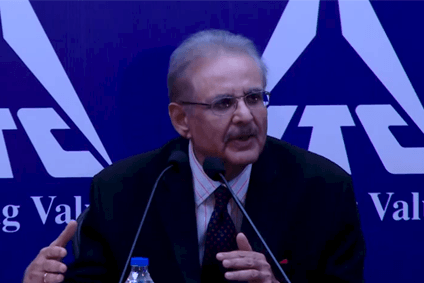
Indian conglomerate ITC this week reported losses from its FMCG arm, as well as a slowdown in sales, but the company’s has big ambitions for its consumer goods business.
ITC said yesterday (30 July) it wants to be the country’s largest FMCG company by 2030, generating annual sales of INR1trn (US$16.42bn).

Discover B2B Marketing That Performs
Combine business intelligence and editorial excellence to reach engaged professionals across 36 leading media platforms.
The company’s origins are in tobacco; the financial results for its first quarter to the end of June showed cigarettes accounted for 38.3% of ITC’s sales but still 85.8% of its EBIT.
However, ITC has a diversified business taking in industries including consumer goods sectors like food, personal care, as well as hotels and paperboard.
The group has ambitions to grow each of its divisions but it was its bold statements about its FMCG arm – which houses food, personal care and stationery – that stood out, especially when considering the competition it faces from food specialists like Britannia Industries and multinational FMCG businesses like Unilever.
ITC chairman Y.C. Deveshwar said the group, which has been operating in the food business in 2001, has a “vision of being the number one FMCG player in India”.

US Tariffs are shifting - will you react or anticipate?
Don’t let policy changes catch you off guard. Stay proactive with real-time data and expert analysis.
By GlobalDataThe company’s food portfolio includes confectionery, snacks, frozen food and staples. It has been working on a move into the dairy sector and is eyeing investment into chocolate. It is also looking to launch into the beverage business.
Speaking to journalists yesterday after ITC reported its first-quarter results, Deveshwar said the group had not been able to expand its food business as quickly as it would have liked due to bureaucratic challenges in India.
“We are unable to invest fast enough because there are bottle-necks in execution due to permissions, obstacles in our path,” Deveshwar said.
However, the ITC chairman said the recent change of government in India meant the situation was improving. Across its business, ITC has 65 investment projects, he said. In March, just-food reported on ITC’s plans for a food and consumer goods manufacturing plant in the northern state of Punjab. The site will make products including spices-to-salt brand Aashirvaad, Delishus biscuits and Bingo! chips.
ITC has yet to launch a dairy product but, asked about its plans for the sector, Deveshwar said the company had been investing in building a supply chain.
“We are building dairy from greenfield [sites] and we have begun from the back-end by doing animal husbandry, by upgrading the quality of cattle, improving the stock of animals and increasing the productivty of milk,” he said. “[We are] progressively growing this business.”
Amnish Aggarwal, senior vice president for research at Prabhudas Lilladher, said ITC could succeed in what is a competitive sector. “Dairy has huge potential and given ITC’s network in rural India and villages, it can emerge as a formidable player in the value added dairy products,” Aggarwal told just-food.
The ITC chairman said the group was studying ways to develop functional foods. “Our R&D is very active in that area. We have got three areas we are focusing on – diabetes, cardiovascular and cognition,” he said. However, he added: “Nothing definite. In research, you cannot set a target and say ‘I will get there by such and such date.'”
However, ITC had ambitions to extend its FMCG business. “Anything that can be characterised as FMCG, sooner or later, ITC will want to enter that business. If ITC continues to succeed in creating world-class brands in the areas we have already entered and gets a market position that is good enough to create surpluses, it will continue to enter new areas of FMCG,” Deveshwar said.
Chocolate could be a challenge for ITC, with Mondelez International dominating the market in India and multinationals like Mars and Ferrero having carved out positions in the sector.
“Chocolates are a competitive space with all the major global brands being present in India,” Aggarwal tells just-food. “However, ITC has good track record of innovations and differentiation in premium food products. One will have to wait and watch regarding the strategy and products with which it enters the market.”
Business development and brand-building costs weighed on the profitability of ITC’s consumer goods arm in the first quarter. Year-on-year, losses from the division actually fell. Aggarwal expects the profitability of ITC’s FMCG business to improve in 2014/15.
“[The] FMCG business had seen first full year of positive EBIT in FY14. The first quarter is a seasonally weak quarter, losses have declined but it is not something unexpected. For the full year FY15, there would be meaningful increase in EBIT,” Aggarwal predicted.





